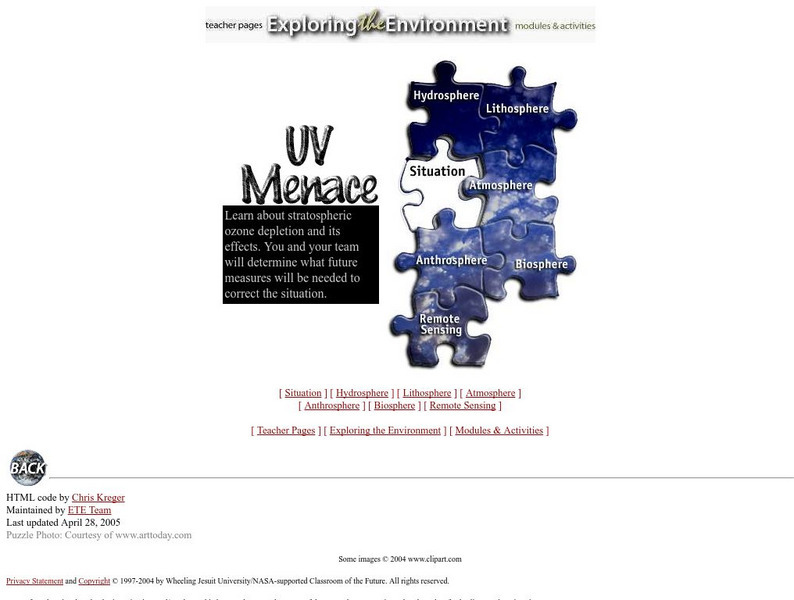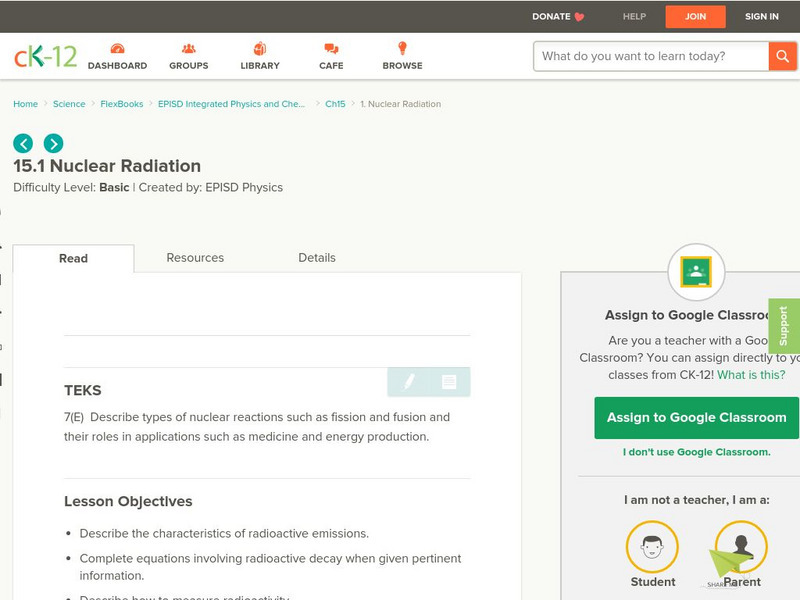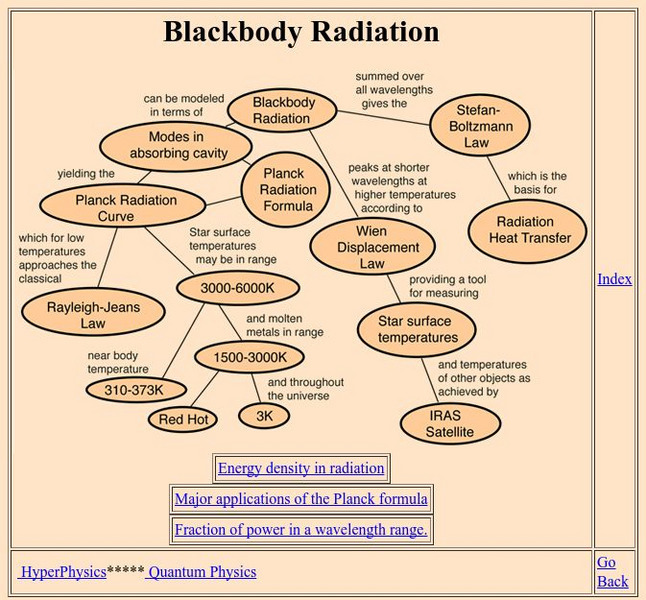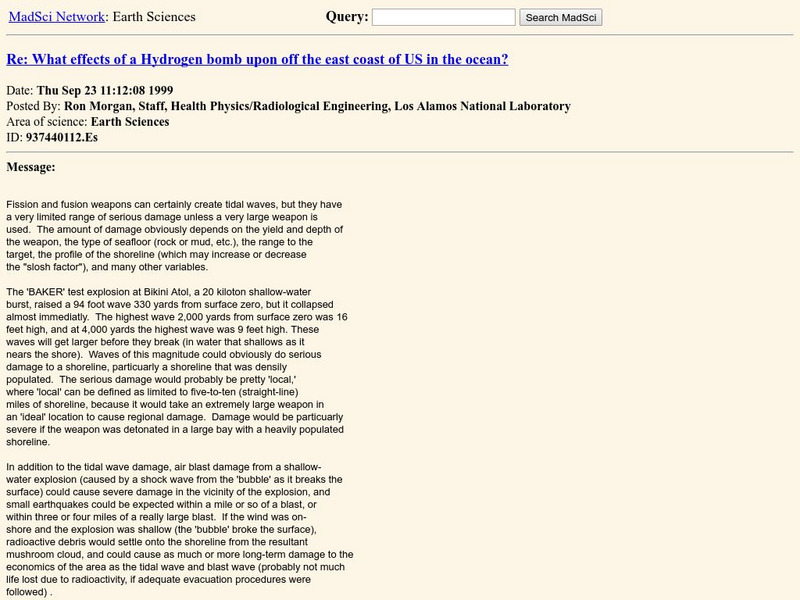Texas Education Agency
Texas Gateway: Law of Conservation of Energy: Heat Transfer
Given illustrations, scenarios, descriptions, and/or diagrams, students will demonstrate understanding of heat transfer.
Texas Education Agency
Texas Gateway: Nuclear Chemistry: Radioactive Decay
Given illustrations, symbols, or descriptions, students will balance nuclear equations.
PBS
Pbs Learning Media: Sources of Radiation
An interactive activity that discusses how radiation is like energy and comes in different forms.
NASA
Nasa Earth Observatory: Global Maps: Net Radiation
View a global map from NASA's Earth Observatory that shows net radiation from July 2006 to November 2008. Learn about radiation and the balance between incoming and outgoing energy in the atmosphere.
King's Centre for Visualization in Science
Explaining Climate Change: Lesson 3: The Chemistry of the Greenhouse Effect
This is the third lesson in a series of learning modules on the topic of climate change. It takes a look at how greenhouse gases cause warming and affect Earth's climate. Includes comprehension questions and interactive tools for...
King's Centre for Visualization in Science
Explaining Climate Change: Lesson 4: Climate: A Balancing Act
How does the Earth's energy balance regulate climate? This is the fourth lesson in a series of learning modules on the topic of climate change. This lesson explores how different factors can impact the amount of energy that enters and...
Other
Nuclear Energy Institute
The Nuclear Energy Institute is an extensive resource for information on nuclear technology, public policy issues, careers in nuclear energy, nuclear power plants, nuclear facts, radiation in agriculture, definitions, and much more.
Other
Nrc: Unit 4 Radioactive Waste
A lesson plan and activity to demonstrate the production, handling, and disposal of radioactive wastes.
Texas Education Agency
Texas Gateway: Heat and Heat Transfer Methods: Glossary
This is a glossary of terms and definitions used in Chapter 14: Heat and Heat Transfer Methods from the AP Physics online text.
University of St. Andrews (UK)
University of St. Andrews: Niels Henrik David Bohr
This resource presents a biography of Bohr, including many personal tidbits, as well as a substantial treatment of his scientific work. Several interesting quotes by and about Bohr are included. It also links to several other sources.
CK-12 Foundation
Ck 12: Heat Transfer
[Free Registration/Login may be required to access all resource tools.] Students explore the relationship between heat and energy transfer, and learn about the three ways that heat can be transferred between objects of different...
PBS
Pbs Learning Media: Heat Transfer
In this interactive activity adapted from the Wisconsin Online Resource Center, students will learn how heat can be transferred in one of three ways: conduction, convection, and radiation.
Center for Educational Technologies
Nasa Classroom of the Future: Environment Module: Uv Menace
This site provides information and activities for classes to learn more about ozone depletion and UV radiation.
Science Buddies
Science Buddies: Project Ideas: How Horses Keep Warm in the Wind
In this mammalian biology science fair project, students will learn about methods of heat transfer and determine the best direction in which horses should stand in a cold wind to maintain their core temperature. The Science Buddies...
PBS
Pbs Learning Media: Sources of Radiation
This interactive activity from the NOVA: "Dirty Bomb" Web site explores sources of radiation, both harmful and beneficial, natural and manmade.
CK-12 Foundation
Ck 12: Heat Transfer
Students explore the relationship between heat and energy transfer, and then describe how energy is transported through the processes of conduction, convection, and radiation. [Free Registration/Login may be required to access all...
CK-12 Foundation
Ck 12: Nuclear Radiation
[Free Registration/Login may be required to access all resource tools.] Students investigate the characteristics of radioactive emissions, and then complete equations involving radioactive decay when given pertinent information.
Other
American Institute of Physics: Marie Curie and the Science of Radioactivity
Resource provides an in-depth exhibit featuring Marie Curie and her contribution to the science of radioactivity.
Nobel Media AB
The Nobel Prize: Antoine Henri Becquerel Biographical
Read about Becquerel's (1852-1908 CE) contributions to the world of science, which earned him The 1903 Nobel Prize in Physics. This detailed biography includes important dates as well as an overview of his world with radioactivity.
Nobel Media AB
The Nobel Prize: The Nobel Prize in Physics 1935 Presentation Speech
The Nobel Physics Chairman made this speech when presenting the Prize to Chadwick. It clearly explains the importance and depth of Chadwick's work. Site by Nobel e-Museum.
Georgia State University
Georgia State University: Hyper Physics: Blackbody Radiation
An indexing page for the HyperPhysics site. This page includes a concept map of links to pages that contain information related to blackbody radiation. Each individual page consists of informative graphics and clear explanations.
Georgia State University
Georgia State University: Hyper Physics: Temperature Regulation of the Human Body
Discusses the methods the human body uses to regulate body temperature. Includes links to the four external heat transfer mechanisms (radiation, conduction, convection, and evaporation of perspiration).
MadSci Network
Msn: What Are the Effects of a Hydrogen Bomb?
From the Mad Scientist Network web site. Using a question and answer format, this page describes some potential effects of a nuclear explosion. The possibilities of tidal waves, earthquakes and radiation-related damages are discussed.
NASA
Nasa: The Geiger Counter
Site from NASA explaining the construction and use of a Geiger counter. The site has links to many related topics, such as plasma, ions, and electrons.




















